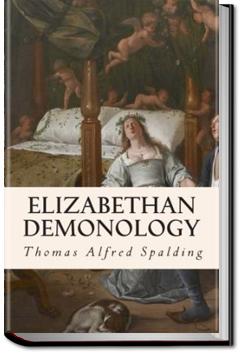UNLIMITED Audiobooks and eBooks
Over 40,000 books & works on all major devices
Get ALL YOU CAN for FREE for 30 days!
Elizabethan Demonology
Thomas Alfred Spalding
Book Overview:
Elizabethan Demonology: An Essay in Illustration of the Belief in the Existence of Devils, and the Powers Possessed By Them, as It Was Generally Held during the Period of the Reformation, and the Times Immediately Succeeding; with Special Reference to Shakespeare and His Works This Essay is an expansion, in accordance with a preconceived scheme, of two papers, one on "The Witches in Macbeth," and the other on "The Demonology of Shakespeare," which were read before the New Shakespeare Society in the years 1877 and 1878. The Shakespeare references in the text are made to the Globe Edition.
Elizabethan Demonology: An Essay in Illustration of the Belief in the Existence of Devils, and the Powers Possessed By Them, as It Was Generally Held during the Period of the Reformation, and the Times Immediately Succeeding; with Special Reference to Shakespeare and His Works This Essay is an expansion, in accordance with a preconceived scheme, of two papers, one on "The Witches in Macbeth," and the other on "The Demonology of Shakespeare," which were read before the New Shakespeare Society in the years 1877 and 1878. The Shakespeare references in the text are made to the Globe Edition.
How does All You Can Books work?
All You Can Books gives you UNLIMITED access to over 40,000 Audiobooks, eBooks, and Foreign Language courses. Download as many audiobooks, ebooks, language audio courses, and language e-workbooks as you want during the FREE trial and it's all yours to keep even if you cancel during the FREE trial. The service works on any major device including computers, smartphones, music players, e-readers, and tablets. You can try the service for FREE for 30 days then it's just $19.99 per month after that. So for the price everyone else charges for just 1 book, we offer you UNLIMITED audio books, e-books and language courses to download and enjoy as you please. No restrictions.
29. Such being the natural history of the conflict of religions, it will not be a matter of surprise that the leaders of our English Reformation should, in their turn, have attributed the miracles of the Roman Catholic saints to the same infernal source as the early Christians supposed to have been the origin of the prodigies and oracles of paganism. The impulse given by the secession from the Church of Rome to the study of the Bible by all classes added impetus to this tendency. In Holy Writ the Reformers found full authority for believing in the existence of evil spirits, possession by devils, witchcraft, and divine and diabolic interference by way of miracle generally; and they consequently acknowledged the possibility of . . . Read More
Try now for FREE!

"Love your service - thanks so much for what you do!"
- Customer Cathryn Mazer
"I did not realize that you would have so many audio books I would enjoy"
- Customer Sharon Morrison
"For all my fellow Audio Book & E-Book regulars:
This is about as close to nirvana as I have found!"
- Twitter post from @bobbyekat



Community Reviews
Parts of this were very interesting - especially that which compared the differences between Catholic and Protestant beliefs about ghosts, demons and possession. However, there was also an oddly disproportionate focus on Shakespeare's plays which brought the rating down a little. Nothing against Sha
You'd seriously struggle to find something both more niche and so directly up my alley as this.
This book is a great analysis of the English mythos of demons and other evil beings. The author used many literary examples to show how people in Elizabethan England viewed these evil beings and how their views evolved over time. Most of these examples were from Shakespeare, which is great since it
Reading this book was a somewhat strange feeling for me personally. The author wrote this essay of about 150 pages as a way of seeking to educating his audience in the beliefs that the Elizabethan era and Jacobean era had about demons. Part of the author's point is to encourage the reader to recog
This is not a book on demonology, this is a book on Shakespeare's use of religion and superstition.
An examination of how witches, demons and the like are perceived by the public at large, with focus on a number of plays by William Shakspeare. Published in 1880, some of the wording and spelling can be a little difficult to follow at times, but it is pretty easy once you get into the flow of the bo